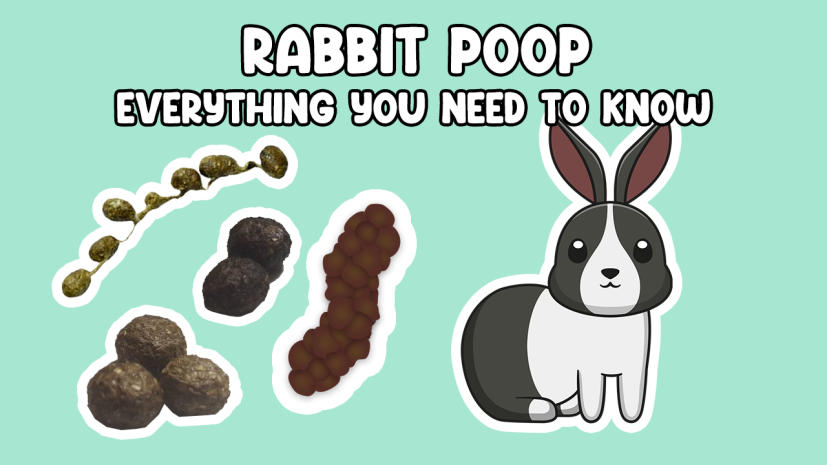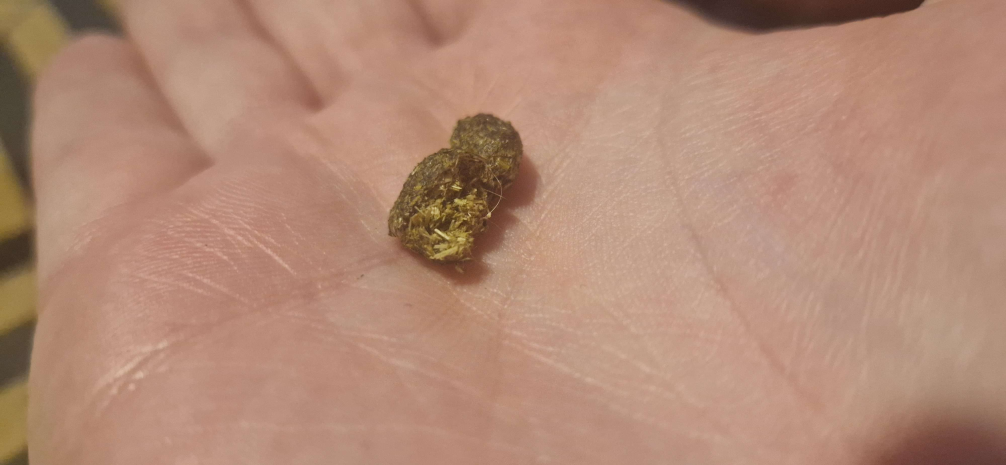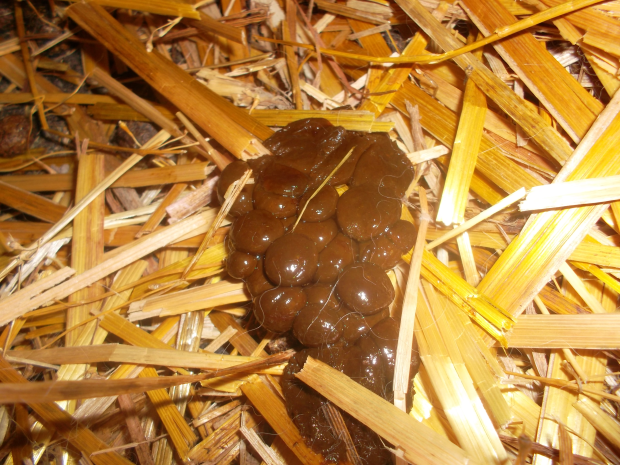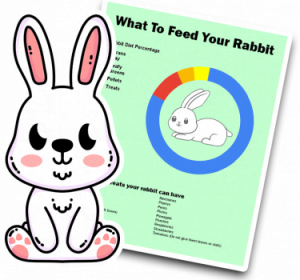
Rabbit poop! That’s right, Poop! – This guide will tackle everything related to rabbit poop. Poop is, at a core, the perfect way of telling if your rabbit is not only healthy but if they have any internal issues.
Rabbits are herbivores, meaning they eat grass, weeds, and hay as a primary of their diet; due to this, their digestive system is susceptible when it comes to processing their diet, which is easily spotted in their poop!
Your rabbit’s quality of poop can be thrown out of whack by simply giving too many treats, not having the right quality or quantity of hay, and even over-feeding their pellets.
First, let’s talk about why rabbit poo is so essential. Unlike other animals, rabbits produce two types of poop – hard, dry, and soft, moist pellets, also known as cecotropes. These cecotropes are essential to a rabbit’s diet, as they contain nutrients, such as vitamins B and K, necessary for their health.
So, when your bunny eats these soft poops, don’t worry – it’s completely normal and healthy! If your bunny is not eating its cecotropes, it could indicate an underlying health issue.
If you’re looking for a single sign of how well your rabbit’s digestive system is functioning and if their diet is as healthy as possible, you can find it directly in rabbit poop. If you notice a change in your rabbit droppings, this can indicate a potential issue.
Fresh rabbit poo should be soft and brittle, and if you apply a little bit of pressure, this should result in your rabbit poop falling apart into a small dusty-like substance. The longer you leave a rabbit poo, the harder it’ll get, so if possible, try checking with a fresh poop!
The inside of your rabbit’s fresh poop should look almost golden, leaning towards a very greenish/yellow tint and many smaller bits.
Healthy rabbit poop should be roughly the size of a pea. If your bunny’s poop is significantly larger or smaller than this, it could be a sign of an underlying health issue. It should also be round and uniform in shape. If your bunny’s poop is misshapen or irregular, it could be a sign of a digestive problem or potentially megacolon.

A good indicator that your rabbit’s poop is okay is if it is light brown or golden brown in color. If your bunny’s poop is a different color, such as black, red, or green, it could indicate an underlying health issue.
Rabbit poop should have a firm and dry texture, with a slight sheen to the surface. It should not be too hard or soft, as both can be signs of digestive problems. If the poop is too hard, it can be difficult for the rabbit to pass, leading to straining and other health issues. If the poop is too soft or runny, it can be a sign of diarrhea. Alternatively, you may be handling cecotropes!
Lastly, your rabbit’s poop should not have a strong odor. If your bunny’s poop is particularly smelly, it could indicate an underlying health issue such as Cecal Dysbiosis
Normal rabbit poo is small, usually black & dark brown in color, and filled with plant and grass pieces. They are slightly moist but dry out quickly. If you examine and break one apart, you will see the undigested plant fiber that it’s formed from, and it crumbles easily.

Droppings that are too small, dark, and irregular in shape show that your rabbit isn’t processing food well. The reason may be a diet with less fiber or a problem that may have slowed down the digestion of food.
If your rabbit stops pooping suddenly and hasn’t pooped for around 24 hours, it means the processing of food has completely stopped, and it’s a life-threatening condition and should be treated by your vet immediately.
Rabbit droppings are usually round and firm, but sometimes they can become stringy or mucus-covered. Stringy rabbit poo looks like a strand of spaghetti, and it can be challenging to clean up. Whilst this isn’t typically something you will need to go to the veterinarian for, it is a sign that your rabbit needs monitoring and access to more fresh greens and hay.

Eating carpet or fabrics: This is the most common we’ve seen for indoor rabbits. If your rabbit gets bored or wants to leave a room, it will often dig and bite the flooring, which in some cases is a carpet. This can lead to stringy feces.
Poor Diet: One of the leading causes of stringy rabbit poo is a diet lacking fiber, high protein, and starch. Rabbits need a high-fiber diet to maintain healthy digestion and produce normal droppings. If a rabbit’s diet does not include enough fiber, their digestive system may not function correctly, leading to stringy droppings.
Overfeeding: Overfeeding rabbits can also lead to stringy droppings. Giving them too many treats or not controlling their food portions can cause digestive problems. Rabbits have sensitive digestive systems, and overfeeding can easily lead to gastrointestinal upset, resulting in abnormal droppings.
Dehydration: Dehydration is another factor that can cause stringy rabbit poo. Rabbits need access to clean, fresh water at all times. If rabbits become dehydrated, their droppings can become dry and stringy, leading to further digestive problems.
Stress: Stress can cause digestive problems in rabbits, leading to stringy droppings. Stressful situations for rabbits can include changes in their environment, loud noises, and overcrowding. Rabbits are sensitive animals, and stress can significantly impact their digestive system.
If your rabbits produce larger egg-shaped poops, this is usually a sign of a megacolon. This will typically only occur if your rabbit has specific genetic (En En) or after a case of trauma. Megacolon poops aren’t a sign of urgency but are a signal to go to your veterinarian and ask for further advice, as your bunny may need a different diet.
Rabbits with Megacolon may not be absorbing all the nutritional value from their food, this can lead to a loss in muscle growth and weight, which can lead to further issues.
We recommend keeping a closer eye on your rabbit for GI Stasis if they have Megacolon and keeping critical care available at all times.
Mucous can indicate an irritated stomach/intestinal lining or after antibiotics. You may find if your rabbit is coming out of stasis with medication in their bloodstream that, they produce poop with mucous covering it. If you’re unsure if your rabbit needs to see the veterinarian, it’s always worth phoning to ensure they’re okay.
Rabbits with Diarrhea need to seek veterinarian attention urgently, this is a common sign that they may have a parasite or ingested a chemical. You may also find that Diarrhea occurs when you introduce new foods into their diet too quickly or a large amount of vegetables tbey’re not familiar with.
If you’re not washing your rabbits greens, this can be an easy route for your rabbit to consume pesticides which can cause an upset stomach, along with ingesting spoiled food.
If you find Diarrhea in your rabbits toilet, try getting a sample in a container for your veterinarian as they can run checks and speed up the recovery process for your furry companion.
Cecotropes are normal and not a cause for concern, they will look squishy in appearance as the droppings are stuck together. Your rabbit will usually eat their cecotropes at night which is why they’ve been given the name “Night Droppings”, but don’t be shocked to find them chowing down during the daylight hours as well!
They are often dark brown or almost black in color. Due to their mucus-like covering, they will appear glossy in nature.

Rabbits eat cecotropes straight from their butt; you may notice your rabbit ducking its head underneath and then sitting up chewing.
If you are finding cecotropes regularly, this can be a sign of over-production, which is often caused by a diet rich in carbohydrates, sugar, and protein, which disturbs the balance of the bacteria in the caecum. Rabbits do not eat these extra droppings as it does not contain essential nutrients, and rabbit poop stuck to the bottom also gets squished on the floor.
Cecotropes, or “soft feces,” result from food fermentation within the digestive system. This is packed with nutrient-rich vitamins, passing out of the body for consumption the second time.

Rabbits consume high-fiber pellets, grass, and special treats that are organic and high in fiber. Feeding your bunny grass hay prevents hairballs in their digestive system.
Because they are herbivores, rabbits and certain small animals must consume vast amounts of fiber each day to maintain the cecotropes process in their digestive system. However, too much fiber triggers constipation.
If your rabbit eats too little, it’ll experience enterotoxemia, intestinal problems like blood poisoning due to enterotoxin.
Coprophagia refers to the consumption of feces. It’s a behavior observed in various animal species, including dogs, rabbits, and some insects. Rabbits practice a form of coprophagia called “cecotrophy.”, rabbits will re-ingest the cecotropes to extract more nutrients from their food.
After catching your rabbit eating his/her own poop, you’re probably wanting to avoid kissing their cute noses now. Don’t worry. A regular bathing session should fix the issue.
However, pay close attention to their stool. Again, it’s normal for rabbits and other animals to consume their own feces. Cecotropes have a distinctive look and texture.
Imagine a dark mulberry or a clumpy chocolate-covered raisin, coated with a shiny finish. This is what a cecotrope looks like. This nutrient-rich waste is coated with a layer of rubbery mucus and a large mass of cecal bacteria. Don’t worry, and there’s no smell to it, so you should feel relieved at some point.
Why is my rabbit’s butt covered with sticky poo? – One cause is that you may be feeding your rabbit too many sugary treats and not feeding your rabbit enough hay. Some foods may also contain hidden sugar in the form of syrups and molasses that bind the pallets together.
As such, we suggest avoiding seed-based treats, as they are a choking hazard and are typically very unhealthy for your rabbit’s gut.
You should opt for foods that contain no sugars and should be high in fiber; you can make these changes slowly so your rabbit’s digestive system can adapt to the new food.
Sugary treats should be restricted for your rabbits as they may cause an upset stomach. If your rabbit does not like eating hay, it may be that they haven’t had hay they like. We suggest trying out different varieties.
You can make eating hay more rewarding for your rabbits by stuffing it in cardboard tubes and folding the ends!
A typical rabbit will poop around 200-350 times a day. The quantity of rabbit poop changes in volume based on how big your rabbit is, how much they eat, and its mood. For example, a rabbit recently scared may produce smaller poops for a few hours.
Rabbits can carry parasites like tapeworms and roundworms, but their waste does not transmit diseases to humans.
However, a single rabbit can excrete hundreds of droppings in a day which doesn’t directly damage your garden but does indicate that your rabbit will urinate, which can damage the grass.
Theoretically, you can catch various diseases from your rabbit, including Pasteurella, Tetanus, Ringworm, and even E. cuniculi. However, this doesn’t necessarily mean they will come from your rabbit’s poop.
Unfortunately, Tapeworms can be acquired from vegetation, fox droppings, dogs & cats, and even wild rabbits, which means this is easily transferred to yourself.
Golden poops or nuggets are known as mean your rabbit has an extremely good diet and their gut is digesting food well. Golden rabbit poop can be seen as a way of viewing your rabbit’s nutritional balance.
Golden poop is even brighter than healthier-looking poop, and the inside is, as it says, golden! It will have a nice yellow tint and look like a golden nugget! Perfect.
You can help your rabbit produce golden poo by feeding them lots of fresh hay that help produce normal poo and cecotropes.
Soft or sticky poo gets stuck to the rabbit’s butt, which attracts the flies to a poopy butt where they lay eggs that hatch out as maggots which may cause severe health conditions in rabbits like Flystrike, also known as ‘myiasis’.
Whenever you find your rabbit dirty, gently clean the rabbit’s butt with warm water and dry it. If you find maggots on their poopy butt, always consult the vet as soon as possible.
You can grab a handful of rabbit pellets and spread it all over your garden. As they break down, they improve and build the structure of the soil, add stability, and hold nutrients for plants and other organisms in the soil as well.
Facts about Rabbit Manure
A healthy rabbit will always produce cecotropes to eat; however, this doesn’t mean you will always see them eating them, as they will often eat their poop at night or during the very early hours of the morning. If you are concerned about them not eating their feces, it’s worth seeing a veterinarian, but your rabbit will instinctively know when they should or should not be eating their poop.
Rabbit feces is not directly toxic to dogs. However, consuming them can pose some health risks. Rabbit poop can carry parasites and bacteria that can harm dogs if ingested. Additionally, if a dog consumes a large amount of rabbit feces, it can lead to gastrointestinal upset.
If you notice your dog has consumed rabbit poop, monitoring them for any signs of distress or illness is essential. If you’re concerned about your dog’s health or notice any unusual behavior, it’s always best to consult a veterinarian.
You should not prevent your bunny from consuming their cecotropes. If you do, this will cause health problems, leading to a dead bunny in their cage. It may sound extreme. However, forcing them to stop this natural process will jeopardize their health and well-being.

By entering your email address you agree to receive emails from Cottontailclub. We'll respect your privacy and you can unsubscribe at any time.